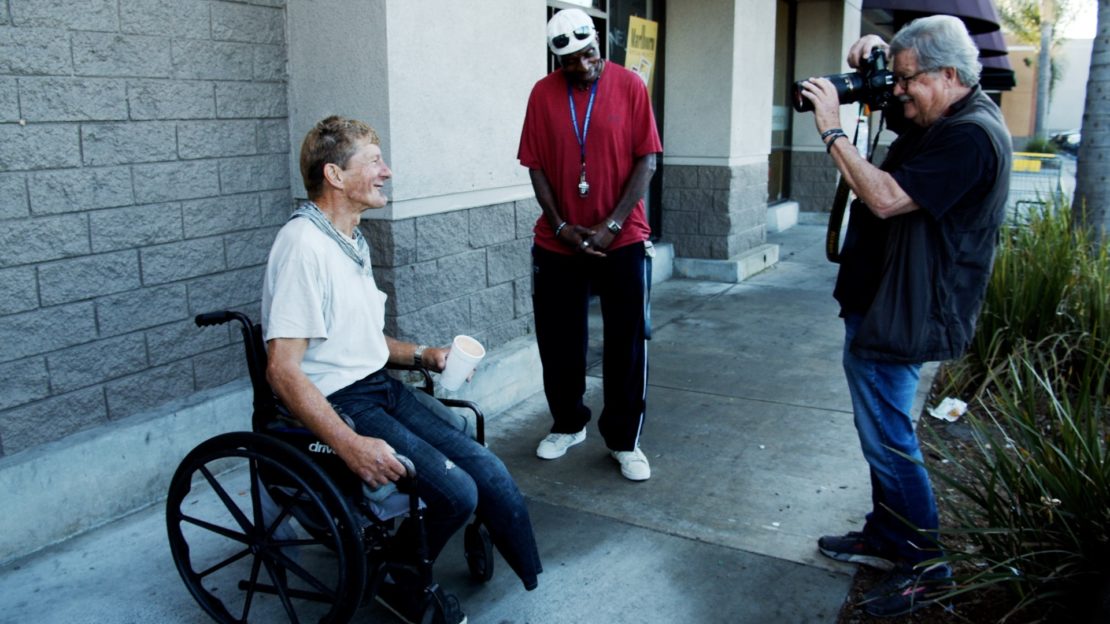When David Freeman retired from his business selling computers in Orange County four years ago, rather than settle down on his couch into retirement bliss, he picked up his Nikon camera and took to the streets.
Traversing across Southern California, Freeman began photographing those experiencing homelessness, taking portraits of its myriad individuals, as a way to raise awareness and foster empathy for a growing part of the population that he says has been abandoned by society.
In the latest chapter of Freeman’s activism, the Long Beach-based photographer has released a documentary, titled “I Am Somebody,” a film that amplifies the voices of Anaheim Street’s denizens, those who take shelter under freeway overpasses and concrete buildings.
“I just want Anaheim Street to be reimagined,” the 79-year-old photographer said. “Something has got to break because it’s going to be a skid row. It’s by far the worst part of Long Beach and it’s getting worse.”
Freeman enlisted the help of Grant White, a 32-year-old Long Beach-based filmmaker, and 64-year-old Willie Beasley, a Chicago native who lived on the streets of Long Beach for nearly 10 years before securing Section 8 housing two years ago. Together the three of them spent weekends for four months filming all along Anaheim Street, asking those without a roof over their heads to share their experiences of homelessness and what they believe needs to be done to help address the issue.
“That’s the beauty about what we did. We didn’t set anything up, we’d just let them talk,” Freeman said. “The only thing I would say off camera is to pretend you’re talking to the mayor, to tell him what it’s really like out here and what you really need.”
Filming for the 27-minute documentary began in October 2019, and ended a few weeks into 2020, just after COVID-19 statewide lockdowns went into effect, Freeman said. White, who was both the videographer and editor of the project, said he spent nearly a year editing the documentary, tweaking and perfecting it so that the humanity of the individuals he captured would shine through the film, which was released on Dec. 22.
“The first day I went out with him [Freeman] I knew this was the most important thing I’ve ever done, period,” White said of his experience making the film, adding that he felt inspired by Freeman’s wealth of empathy for those most vulnerable in society.
“He just talks to them,” White said. “Some of the guys we met were passed out with their face in the gutter. He woke them up, talked to them, told them they are somebody, said here’s some food, here’s my card, I believe in you.”

The locations shown in “I Am Somebody” are in various neighborhoods and business corridors along Anaheim Street. From the Homeland Cultural Center in Cambodia Town to the banks of the Los Angeles River bordering the 710 Freeway, an area Freeman said is often overlooked.
Both Freeman and White say that the locations and interviews that were filmed couldn’t have been achieved without the help of Beasley, who acted as an intermediary between the team and those they interviewed.
“He got us to places and got people talking that would have never happened without him being there,” White said about Beasley.
Freeman, who has been a member of the Long Beach Homeless Coalition for five years now said he believes that permanent, affordable housing is the best solution to addressing the issue of homelessness in the city. He has worked for years with various non-profits, community and government organizations in an effort to see this realized. Through his film he hopes to drive the conversation of homelessness in that direction, but admits he’s been frustrated by the lack of interest or traction from the city’s political leaders.
In the meantime, Freeman said he’s still going out, walking Anaheim Street nearly four times a week, photographing and checking in on those he’s met along the way, although these days, due to COVID, he shoots mostly from his car. Freeman said as long as he can make a difference, he’ll continue to do so.

